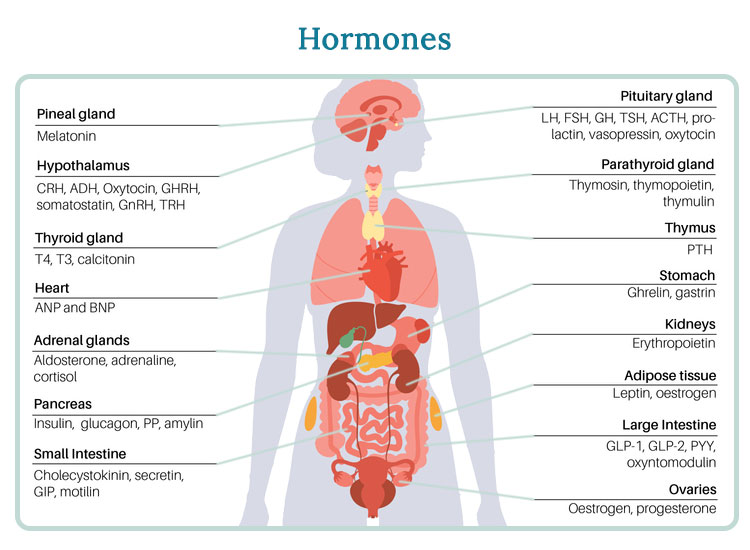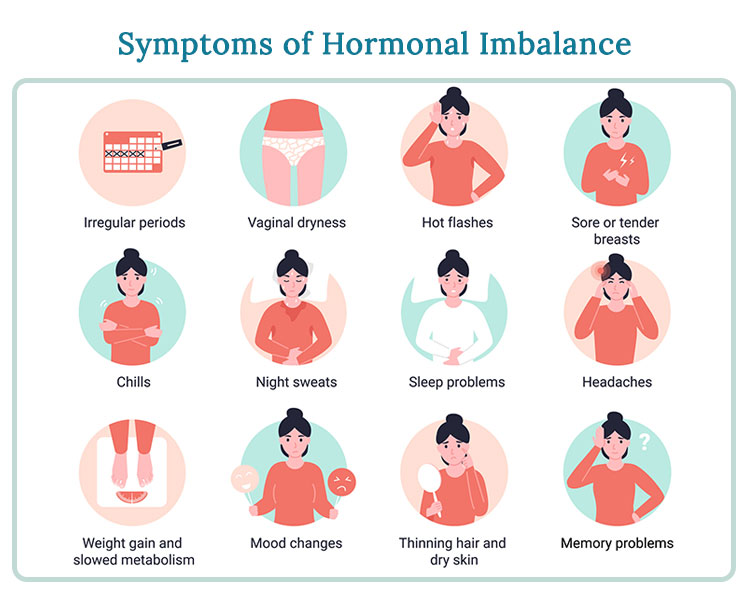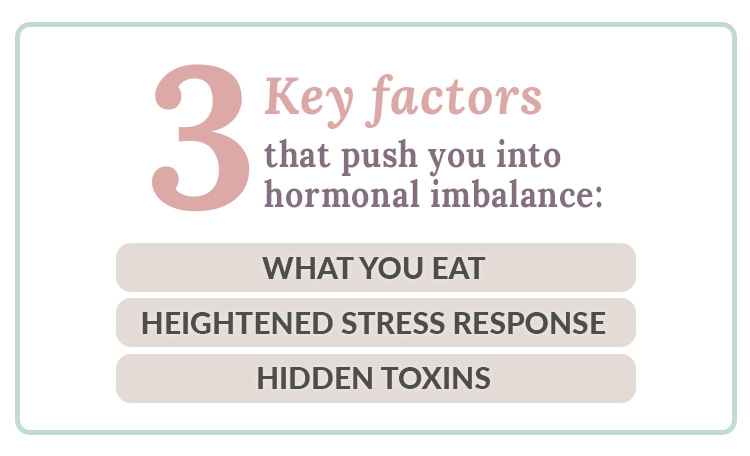Hormonal imbalance in women
The secret to power, happiness & longevity is in your hormones
There’s a good argument that women are given the wrong messages by our culture about their health – all those messages about being thin, young and beautiful. But there’s not enough thought given to the right messages that women should be given to really be healthy – and happy.

One key message should be: keep your hormones balanced. So in this article we’re going to tell you about:
- Why it’s so important to balance your hormones
- What causes hormonal imbalance
- What conventional medicine gets wrong about hormonal imbalance
- The major symptoms of hormonal imbalance
- Health conditions caused by hormonal imbalance
- Natural ways to balance your hormones
What is hormonal imbalance?
Hormonal imbalance refers to a condition in which the body’s production of hormones and its ability to maintain normal levels and ratios of hormones become disrupted. Hormones are chemicals that your body makes to help it regulate various functions, from sleep/wake cycles to your ability to get pregnant. The over 50 hormones your body produces are designed to work like a fine-tuned orchestra, balancing each other out and synergistically supporting each other as needed. It’s a system that self-adjusts second-by-second for your entire life to produce proper amounts of hormones and keep them in healthy ratio with each other.
You are mostly unaware of this complex hormonal balancing act — until it begins to break down. The body’s delicate hormonal system is vulnerable to stress, poor diet, toxins and other negative factors that can throw hormones into a tail spin. In women, certain hormones are more susceptible to imbalance. These include sex hormone imbalances, especially related to pregnancy, periods and menopause, as well as imbalances in hormones that control metabolism and weight, thyroid function, sleep cycles and the body’s response to stress. Symptoms of hormonal imbalance include weight gain, fatigue, mood changes and irritability, sleep problems, hot flashes, hair loss, food cravings, and irregular periods. Over time, that hormonal imbalance can lead to more severe problems, even disease.

Why it’s so important to balance your hormones
Imagine trying to drive your car with flat tires, a dark windshield, and the parking brake on. If that seems like an exaggerated picture, consider these facts:
- Obesity almost always involves hormonal imbalance.
- High blood pressure always involves hormonal imbalance.
- Joint pain and arthritis always involve hormonal imbalance.
- Thyroid dysfunction is a form of hormonal imbalance.
- Fatigue, anxiety and depression all have a hormonal dimension.
- Digestion and your gut flora are essential for hormonal balance.
These are among the most common health problems afflicting women in modern countries, especially in America. In fact, doctors recognize there is an epidemic of hormonal disorders. Why? Because modern life – with its poor diet, heavy toxins and constant stress – is essentially bad for your hormonal balance. That’s why you’ve got to understand how to assess your hormonal imbalance and manage it.
Here’s why your doctor is wrong about hormonal imbalance
When a new or uncomfortable symptom develops, most women rely on their physicians to provide answers and solutions — this is especially true when you’re suffering from confusing symptoms of hormonal imbalance during peri/menopause.
So women are understandably dismayed when their doctors apply Band-Aid solutions to symptoms of hormonal imbalance like hot flashes, fatigue, anxiety and insomnia. We hear from thousands of peri/menopausal women who have been dismissed by conventional doctors with nothing more than a prescription for an antidepressant, birth control pills, or synthetic hormone replacement therapy. They may even ask their doctor about tests to check their hormone levels, only to be denied and told not to be concerned, or worse, that’s it all in their head. Not only are these woefully inadequate solutions — they can also be downright dangerous.

Just as every woman is unique, so is her hormonal balance. Understanding and effectively treating hormonal imbalances requires a whole-body approach, rather than looking at your health as a set of independent issues. This is especially true with hormones, which are all interrelated. The holistic approach we have advocated for so many years is very different from what you’ll see in today’s medical system, which at times can seem hopelessly out of touch with the care that real women deserve.
Here are just a few examples of the way conventional medicine fails women suffering from symptoms of hormonal imbalance.
Doctors are still prescribing synthetic HRT
Synthetic hormone replacement therapy (HRT) was once the gold standard for conventional treatment of women’s menopause symptoms — until we learned the dire consequences of this approach. In 2004, the large-scale Women’s Health Initiative (WHI) revealed that synthetic HRT put women at serious risk of breast cancer, stroke and other life-threatening disorders. The study was a bombshell because, at the time, more than 10 million women were being prescribed some form of synthetic HRT, most commonly during menopause.
The forms of synthetic HRT studied in the WHI included medications such as conjugated equine estrogen (Premarin) and synthetic progestins. Many conventional doctors backed off prescribing these drugs. But guess what? Thanks to the powerful driving force of Big Pharma, synthetic HRT has been creeping back as a standard treatment offered to women — with the same risks!
Here’s the truth: these synthetic hormones have no place in your body. Women have so many other ways to effectively rebalance your hormones. It’s always worth exploring these options.
Medical schools don’t teach doctors about women — or their hormones
Fact: According to a Yale study of US medical schools, only 17% of medical schools offered a course in women’s health as part of their core curriculum — and only 25% offered clinical rotations in women’s health beyond obstetrics and gynecology.
The truth is, most physicians simply don’t learn about women’s health, hormonal imbalance, or the chronic conditions that disproportionately affect women due to their hormones. Medical schools train doctors to take a reductive approach to treating their patients, as though the body was a machine with separate parts. This couldn’t be further from the truth — especially when it comes to the complex, interconnected nature of women’s bodies and their hormones.
In order to truly rebalance the body and find lasting relief, you must first identify and treat the underlying causes of your symptoms. For example, there is an established connection between a high sugar diet and hormonal imbalance, but if doctors barely take any nutrition classes in med school, discussions about nutrition may elude them. Conventional medicine may provide quick fixes and Band-Aid solutions that give you temporary relief, but the system simply isn’t set up to diagnose or treat the root cause of hormonal imbalance or provide lasting, effective solutions.
Symptoms of Hormonal Imbalance
Although most people tend to focus on sex hormones related to pregnancy, menstrual periods and menopause, you actually have many types of hormones — and they control many other important functions including metabolism and weight, thyroid function, sleep cycles and your stress response. Hormonal imbalance occurs when normal levels and production of hormones in the endocrine system, or their ratio to other hormones, is disrupted.

Even though all your hormones together form the foundation of your health, you may not realize how many symptoms and health conditions are rooted in hormonal imbalance, including:
- Irregular or absent periods: Irregular periods or absent periods indicate a disruption in the hormonal signaling activity that controls menstruation. Thyroid dysfunction and estrogen dominance only make this hormonal imbalance worse.
- Weight gain: Changes to your weight, especially belly fat, are caused by shifting hormones, particularly in peri/menopause. High stress, poor sleep, and nutrient deficiencies also increase belly fat. Losing weight is becomes more difficult because hormonal imbalances contribute to weight loss resistance.
- Fatigue & Low Energy: Thyroid imbalances, adrenal gland dysfunction and chronic stress are the most likely contributors to this debilitating symptom, which can leave you feeling physically and emotionally drained — even after plenty of sleep.
- Irritability and/or moodiness: Feeling out of controlor overwhelmed can be caused by sudden changes in the balance between estrogen, testosterone and progesterone, and from adrenal stress.
- Skin Issues: Dry skin, adult acne, and premature aging are all deeply rooted in hormonal imbalance. For example, adult acne is associated with polycystic ovarian syndrome (PCOS), a hormonal condition that also causes irregular or absent menstrual periods.
- Hair Loss & Unusual Hair Growth: Thyroid hormone imbalances and fluctuating levels of estrogen and testosterone can cause hair loss and thinning hair. High levels of testosterone (especially in PCOS) can lead to excessive and unwanted hair growth, especially on the face.

Assess your symptoms
For more than 20 years, we’ve advocated a holistic approach to hormonal imbalance that considers everything in the body to be beautifully connected — with hormones forming the foundation of these complex connections. In order to effectively treat any symptom, it’s crucially important to consider all of the factors that contributed to the development of that symptom. Our free, doctor-developed hormonal imbalance quiz can help you assess your symptoms and get on the right path to whole-body healing. Take it now!
Health conditions caused by hormonal imbalance
Adrenal stress & fatigue
A symptom-based syndrome tightly linked to the physical and emotional effects of chronic stress and excess cortisol. Being under stress day after day, week after week, forces the adrenal glands to work overtime, pumping out the stress hormone cortisol at emergency levels. This produces symptoms including chronic fatigue, anxiety, insomnia, and more.
- Think you may be suffering from symptoms of Adrenal Fatigue? Our free Adrenal Health Quiz can help you assess your symptoms.
- Learn more about adrenal stress & fatigue.
Peri / Menopause
A time of natural transition in a woman’s life that results in the end of a her monthly periods and reproductive cycles. Women in menopause are susceptible to developing intense hormonal imbalances that trigger uncomfortable (and sometimes downright debilitating) symptoms we’ve come to associate with the menopause transition: hot flashes, night sweats, anxiety, weight gain, low libido, irritability and more. Our stance? Menopause is inevitable — but suffering through symptoms is not.
- Think you may be suffering from symptoms of menopause? Our free Menopause Quiz can help you assess your symptoms.
- Learn more about menopause and peri-menopause
Thyroid dysfunction
Your thyroid gland produces hormones that regulate energy levels, healthy weight, and the metabolism of each and every cell in your body. When a thyroid hormone balance develops, you see it in the form of symptoms including weight gain, fatigue, brain fog, dry skin, brittle and thinning hair, and feeling cold all the time.
- Concerned you might have low thyroid? Our free Thyroid Quiz can help your assess your symptoms right now.
- Learn more about thyroid health and hypothyroidism (low thyroid).
Other health issues directly related to hormonal imbalance:
- Obesity
- Stress-Related Illnesses: Heart Disease, cancer, autoimmune disorders, etc.
- Inflammatory Illnesses
- Diabetes
- Hashimoto’s Thyroiditis
- Depression, Anxiety, and Mental Health Conditions
- Bone Health, Osteoporosis, Arthritis, etc.
- Gut Imbalances, IBS/IBD, Crohn’s Disease, Leaky Gut Syndrome
- High Blood Pressure
- Immune System Dysfunction
- Uterine Fibroids, Endometriosis, PCOS
- Premature Ovarian Failure (POF)
Natural Treatment options for a hormonal imbalance
Many of us have become conditioned to view pharmaceutical drugs as the only ‘real’ medicine, but that couldn’t be further from the truth. Phytotherapy, or plant-based therapy, is not only equally effective as pharmaceuticals — it also produces few, if any, side effects.
One reason phytotherapy is so effective is that certain herbs (known as phytocrines) share important features with natural hormones, thus enabling them to increase the body’s natural ability to make and use its own hormones and provide powerful symptom relief.
What’s more, the natural approach works in a completely different way than conventional medical solutions like prescription drugs or synthetic HRT. Because it works with your body, a natural solution can actually prevent or reduce the severity of nearly all of your symptoms rather than just smoothing them over temporarily. New research is constantly proving that plant molecules act to balance hormones at the cellular level, just as they have for thousands of years.
The adaptogenic effect: natural, safe and effective
Unlike pharmaceuticals, medicinal herbs rarely produce side effects. They’re inexpensive, and because they’re found in nature, plant-derived remedies are readily accessible to people all over the world. While a drug usually contains an amplified active ingredient, a whole plant (or plant extract) generally contains an assortment of constituents that are synergistic (working together).
This not only enhances the plant’s effectiveness, but also reduces risk of toxicity. Phytotherapy uses cell signaling to benefit our bodies early in the process of disease and imbalance, whereas pharmaceuticals are generally designed to only eradicate isolated symptoms. This does nothing to target, and resolve, the underlying cause of hormonal imbalance symptoms.
One thing we love about phytotherapy is it gives us a more nuanced approach to healing that’s gentler than the “sledgehammer” effect that conventional pharmaceutical drugs can have. With phytotherapy — particularly those adaptogenic herbs that tonify (stimulate energy flow) and nourish — the body can usually get what it needs, and only what it needs.
Like a gardener caring for a plant that needs more water on some days than others, most medicinal herbs are capable of both responding actively and quietly ‘listening’ to your hormone signaling cells to gauge what your body needs. Adaptogenic herbs are normalizing to your system and can be taken safely long-term. Synthetic drugs simply cannot mimic the brilliant adaptogenic effect of natural remedies, or the level of safety provided by medicinal herbs.
The good news is that when a woman needs help for her symptoms, targeted herbal remedies — or phytotherapy — can make a huge difference for hormonal symptom relief.
How we can help you heal
Hormonal imbalance can seriously disrupt your life. But the silver lining to all this is that it’s correctable. You can bring your hormones back into balance and feel like yourself again. We’ve seen time and again how a combination approach with specialized hormone health supplements, a wellness-supporting diet, and exercise that you enjoy can restore balance and relieve symptoms.

All you need to do is learn the basics about hormonal balance and how to take charge of your health again. So, let’s get started understanding your symptoms and underlying issues so you can provide the targeted support your body needs to naturally rebalance its hormones. When you’re ready to take the next step, our natural support formulas for hormonal balance can help resolve the root cause of all your symptoms, not just a select few.
Need more support right now? Call us today at 1-800-448-4919! Talk to one of our women’s care associates here in Maine. We have helped thousands of women understand their options for natural resolving their hormonal health issues. We can help you too.
Hormonal Imbalance: Frequently Asked Questions
What causes hormonal imbalances in women?
At every age, your hormones are fluctuating on a daily basis, in mostly predictable patterns. But sometimes hormones fluctuate more dramatically, like a boat rocking and surging up and down in a stormy sea. When this state of flux become too extreme, the body can no longer maintain hormones in their normal ratios and levels. The result of this is the dysfunctional state of hormonal imbalance.
There are many possible causes of hormone imbalance in women, including:
- Perimenopause & menopause: As levels of estrogen and progesterone fluctuate in perimenopause and menopause, it’s common for hormonal imbalances to develop. Symptoms of a hormonal imbalance related to perimenopause and menopause include hot flashes, mood changes, weight gain (especially belly fat) and insomnia.
- Polycystic ovary syndrome (PCOS): This is a common hormone disorder that affects up to 10% of women of reproductive age. It is characterized by an imbalance of hormones such as testosterone and estrogen, and it can cause symptoms such as irregular periods, acne, and weight gain.
- Thyroid disorders: The thyroid is a gland that produces hormones that regulate metabolism and energy levels. When the thyroid is not functioning properly, it can cause a hormonal imbalance and a range of low thyroid symptoms such as fatigue, weight gain, and hair loss.
- Stress: Chronic stress can disrupt the normal functioning of the body’s adrenal hormone systems, leading to imbalances in cortisol and other stress hormones. Fatigue and food cravings are two common side effects of an adrenal hormone imbalance.
- Poor diet: A diet high in processed and sugary foods can contribute to hormonal imbalances. With a poor diet, the body may not get enough of the nutrients it needs for hormone building and at the same time gets too much hormone-disrupting sugar and food toxins.
- Certain medications: Some medications, such as birth control pills and steroids, can interfere with hormone production and cause imbalances.
- Other medical conditions: Issues such as pituitary gland disorders and cancer can also cause hormonal imbalances.
How do you overcome hormonal imbalance?
When you discover that you have a hormonal imbalance, the good news is that there is so much you can do — naturally and without medication! — to restore balance to your hormones and find relief from your symptoms. Steps include:
- Eat a healthy diet: A diet rich in fruits, vegetables, and healthy proteins provides the nutrients needed to support normal hormone production and hormonal balance. Sugary and processed foods can set hormonal imbalances in motion and are important to avoid.
- Get enough sleep: Getting too little sleep robs your body of needed “down time” for hormonal system repair. Try to get at least 7-9 hours of sleep per night.
- Manage stress: Stress is a known trigger for hormonal imbalances. Try techniques such as meditation, deep breathing, or yoga to help manage stress.
- Vitamins and herbal phytotherapy (plant medicines): Certain supplements and herbs, such as omega-3 fatty acids, magnesium, iodine, selenium, and adaptogenic Ashwagandha offer powerful help to support hormonal balance. For best results, use herbs and vitamins targeted towards your specific imbalance.
Depending on the severity of the hormonal imbalance, restoring balance and reducing symptoms can take time and require a combination of lifestyle changes listed above. Listen to your body and take good care of it. Your hormones will thank you!
What happens if “female hormones” are imbalanced?
Imbalances in the female sex hormones estrogen and progesterone are more common during periods in a woman’s life when her hormones naturally fluctuate, including postpartum and during perimenopause and menopause. Other factors that contribute to estrogen/progesterone imbalance include stress and poor diet. Sex hormone imbalances can produce a range of symptoms and health issues, including hot flashes, night sweats, anxiety, depression, irritability, irregular periods, weight gain (especially midsection weight gain), and low libido. Estrogen/progesterone imbalances in menopause can also contribute to accelerated bone loss and increased risk for osteoporosis.
How can I check my hormone levels at home?
In helping thousands of women recover from hormonal imbalance, we always recommend to women to let their symptoms be the guide. The body is extremely intelligent in triggering red flags to send you an SOS that hormonal help is needed. We developed our hormonal health quizzes to give you a quick and easy (and free!) way to learn more about your symptoms and the imbalance that is triggering them. The best way to start learning what could be going on in your hormones is to take our Hormonal Imbalance Quiz.
Other ways to check in on the state of your hormones include:
- Saliva test: Saliva testing is a simple, non-invasive way to measure hormone levels. You can purchase a saliva test kit online or through a healthcare provider. The kit will come with instructions on how to collect and store your saliva sample, which you can then send to a laboratory for analysis.
- Home testing kits: There are also home testing kits available that allow you to test your hormone levels without leaving your home. These kits are available for a variety of hormones, including testosterone, estrogen, and thyroid hormones. Home testing kits might require a finger prick to obtain a blood sample or saliva or urine collection.
- Blood test: This one is done at a lab, not at home, but you can also check your hormone levels through a blood test. This can be done through a healthcare provider or at a laboratory.
What foods help to balance hormones?
Nutrients from the foods you eat provide raw materials for hormone production and also support the body’s ability to maintain healthy hormone metabolism. Foods to eat to help correct a hormonal imbalance include:
- Cruciferous vegetables: Vegetables from the “brassica” family including broccoli, cauliflower and Brussels sprouts contain Indole-3-carbinol, a phytochemical that promotes liver function. The liver metabolizes hormones and detoxifies and clears “spent” and unhealthy metabolites of hormones, helping to restore hormonal balance and health.
- Leafy greens: Leafy greens like kale, spinach, and broccoli contain antioxidants and phytochemicals that help to protect and repair cells in the body that produce hormones.
- Fermented foods: Fermented foods like yogurt, kefir, and sauerkraut contain probiotics, which are beneficial bacteria that help to support gut health. When your gut flora is healthy, it’s easier for nutrients in your foods to be absorbed and go where they are needed to support hormonal balance.
- Healthy fats: Healthy fats like olive oil, avocado, and nuts that contain Omega-3 essential fatty acids (i.e. walnuts) provide important building blocks for hormones.
- Lean protein: Lean protein sources like chicken, fish, and tofu provide the building blocks for hormones and can help to support their production and function.
How does a hormonal imbalance affect your life?
Hormonal imbalances that take place over a woman’s lifespan can have a wide range of effects on the body, depending on which hormone is involved. Here are some ways that hormonal imbalances can impact your life:
- Weight gain: Hormonal imbalances, especially thyroid imbalance, can slow your metabolism, leading to weight gain. An adrenal hormone imbalance that results in high levels of cortisol (a stress hormone) can cause weight gain, particularly mid-section belly fat weight gain
- Mood changes: Hormones play a role in regulating mood, so imbalances can lead to changes in mood or emotional well-being. For example, low levels of serotonin (a neurotransmitter that affects mood) can lead to depression, while estrogen fluctuations can cause irritability and anxiety.
- Sleep problems: Hormonal imbalances can disrupt your sleep patterns, leading to insomnia or other sleep disorders. For example, high levels of cortisol can interfere with the production of melatonin (a hormone that helps regulate sleep), while imbalanced estrogen can lead to difficulty falling asleep or staying asleep.
- Changes in physical appearance: Hormonal imbalances can cause physical changes in the body, such as acne, hair loss, or changes in skin or nail health. For women in menopause, a hormonal imbalance involving estrogen can result in thinning hair or dry, thin skin.
- Irregular menstrual cycles: Women with hormonal imbalances frequently experience irregular periods. This is often a result of an imbalance involving estrogen/progesterone and is a common symptom of hormonal imbalance during perimenopause.











